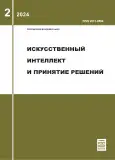Optimization of the operation of an oil refining plant using a neural network forecast of its economic efficiency
- Authors: Nuzhny A.S.1, Levchenko E.N.1, Usmanov M.R.1
-
Affiliations:
- Limited Liability Company «LUKOIL-Engineering Skills and Competencies»
- Issue: No 2 (2024)
- Pages: 53-61
- Section: AI-enabled Systems
- URL: https://journal-vniispk.ru/2071-8594/article/view/265409
- DOI: https://doi.org/10.14357//20718594240204
- EDN: https://elibrary.ru/LSUAWI
- ID: 265409
Cite item
Full Text
Abstract
The problem of optimal control of an oil refining unit is considered. The proposed approach is based on the construction of a predictive model predicting the economic efficiency of the installation. This model is built by training a recurrent neural network. The effectiveness of the proposed approach is shown by the example of the installation of hydrocracking of tar. Optimization of the forecast econ- omy of the installation according to its control parameters allows us to obtain their optimal values that maximize the predicted economic efficiency. The correctness of the recommendations received was evaluated by experts, as well as by conducting a natural experiment.
About the authors
Anton S. Nuzhny
Limited Liability Company «LUKOIL-Engineering Skills and Competencies»
Author for correspondence.
Email: nuzhny@inbox.ru
Candidate of physical and mathematical science, Chief Specialist of the Digital Modeling Center, Senior Researcher, Institute for Problems of Safe Development of Nuclear Energy RAS. Assistant Professor, National Research University MIPT
Russian Federation, Nizhny NovgorodEvgeniy N. Levchenko
Limited Liability Company «LUKOIL-Engineering Skills and Competencies»
Email: evgeny.n.levchenko@lukoil.com
Head of the Digital Modeling Center
Russian Federation, Nizhny NovgorodMarat R. Usmanov
Limited Liability Company «LUKOIL-Engineering Skills and Competencies»
Email: usmanovmr@bk.ru
Candidate of technical sciences, General Director, Doctoral student, Gubkin Russian State University of Oil and Gas
Russian Federation, Nizhny NovgorodReferences
- Nuzhny A.S., Odnolko I.S., Glukhov A.Yu., Piskunov I.V., Vyshinsky I.M., Levchenko E.N., Starikov A.S. Ispol'zovanie metodov mashinnogo obucheniia dlia prognozirovaniia soderzhaniia sedimentov (HFT) v nekonvertiruemom ostatke s ustanovki gidrokrekinga gudrona [Using machine learning techniques to predict the content of sediments (HFT) in an unconverted residue from the tar hydrocracking unit] // Neftepererabotka i neftekhimiia. Nauchno-technicheskie dostizheniia i peredovoi opit [Oil refining and petrochemistry. Scientific and technical achievements and best practices]. 2020. No 7. P. 1–8.
- Shumikhin A.G., Musatov D.A., Vlasov S.S., Nemtin A.M., Plekhov V.G. Opyt razrabotki i vnedreniia sistem usovershenstvovannogo upravleniia tekhnologicheskimi protsessami neftepererabotki na baze virtual'nykh analiza- torov kachestva [Experience developments and introduc- tion advanced technologicals processes control oil refining based virtual quality analysers] // Vestnik Permskogo natsional'nogo issledovatel'skogo politekhnicheskogo uni- versiteta. Khimicheskaia tekhnologiia i biotekhnologiia [Bulletin of the Perm National Research Polytechnic University. Chemical technology and biotechnology]. 2016. No 2. P. 39–53.
- Itskovich E.L., Dozortsev V.M., Kneller V.V. Usovershenstvovannoe upravlenie tekhnologicheskimi protsessami (ARS): 10 let v Rossii [Advanced process con- trol (APC): 10 years in Russia] // Avtomatizatsiya v promishlinnosti [Automation in industry]. 2013. No 1. P. 12–19.
- Nuzhny A. S., Odnol’ko I. S., Glukhov A. Yu., et al. Opti- mizing the content of the sediments in the process of hudron's hydrocracking with the use of machine learning methods // Applied Mathematics and Control Sciences, 2021. No 1. P. 7-22.
- Seber J. A. F. Linear regression analysis. New York etc., 1977.
- Friedman J.H. Greedy function approximation: a gradient boosting machine // The Annals of Statistics. 2001. V. 29. No 5. P. 1189–1232.
- Hastie T., Tibshirani R., Friedman J. Chapter 15. Random Forests // The Elements of Statistical Learning: Data Min- ing, Inference, and Prediction. 2nd ed. Springer-Verlag, 2009. P. 746.
- Goodfellow Ian, Bengio Yoshua, Courville Aaron. Deep Learning. Cambridge, Massachusetts, London, England: The MIT Press, 2016. P. 316 – 351.
- Nuzhny A.S. Baiesovskii podkhod k reguliarizatsii zadachi obucheniia seti funktsii radial'nogo bazisa [Bayesian ap- proach to regularization for training task of radial basic functions network] // Iskusstvenniy intellekt i prinyatie resheniy [Artificial Intelligence and Decision Making]. 2015. No 2. P. 18–24.
- Nelder J.A., Mead R. A simplex method for function mini- mization // Computer Journal. 1965. V. 7. P. 308 – 313.
- Polak Elijah. Computational methods in optimization. London: Academic press, 1971.
- Philippov O. Yandex ClickHouse. Bistree ne kuda [There 's no place faster] // Sistemniy Administrator [System Admin- istrator]. 2017. No 1-2 (170-171). P. 56-58.
Supplementary files








